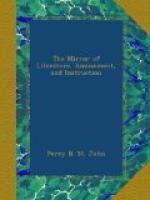With these words the soldier turned on his side, under shelter of a grave, and as his libations had been rather copious during the day, it was not long before he gave audible testimony that the dread of supernatural visitants had had no effect in disturbing the even current of his fancy. Although Larry had not opposed the proposition of his kinsman, yet he felt by no means at ease. He put in practice all the usually recommended nostrums for keeping away unpleasant thoughts:—all would not do. “If it was a common, dacent, quite (quiet,) well-behaved churchyard a’self,” thought Larry, half-aloud—“but when ’tis a place like this forsaken ould berrin’-ground, which is noted for villiany”—“For what, Larry?” said a gentleman, stepping out of a niche which contained the only statue time had spared. It was the figure of Saint Colman, to whom the church was dedicated. Larry had been looking at the figure, as it shone forth in ebon and ivory in the light and shadow of the now high-careering moon, “For what, Larry,” said the gentleman,—“for what do you say the churchyard is noted?” “For nothing at all, plase your honour,” replied Larry, “except the height of gentility.” The stranger was about four feet high, dressed in what might be called flowing garments,—if, in spite of their form, their rigidity did not deprive them of all claim to such an appellation. He wore an antique mitre upon his head; his hands were folded upon his breast; and over his right shoulder rested a pastoral crook. There was a solemn expression in his countenance, and his eye might truly be called stony. His beard could not be well said to wave upon his bosom; but it lay upon it in ample profusion, stiffer than that of a Jew on a frosty morning after mist. In short, as Larry soon discovered to his horror, on looking up at the niche, it was no other than Saint Colman himself, who had stept forth, indignant (in all probability) at the stigma cast by the watcher of the dead on the churchyard of which his Saintship was patron. He smiled with a grisly solemnity—just such a smile as you might imagine would play round the lips of a milestone (if it had any,) at the recantation so quickly volunteered by Larry. “Well,” said he, “Lawrence Sweeney”—“How well the old rogue,” thought Larry, “knows my name!” “Since you profess yourself such an admirer of the merits of the churchyard of Inistubber, get up and follow me, till I show you the civilities of the place—for I am master here, and must do the honours.” “Willingly would I go with your worship,” replied our friend; “but you see here I am engaged to Sir Theodore, who, though a good master, was a mighty passionate man when every thing was not done as he ordered it; and I am feared to stir.” “Sir Theodore,” said the Saint, “will not blame you for following me. I assure you he will not.” “But then,” said Larry—“Follow me!” cried the Saint, in a hollow voice, and casting upon him his stony eye, drew poor Larry after him, as the




